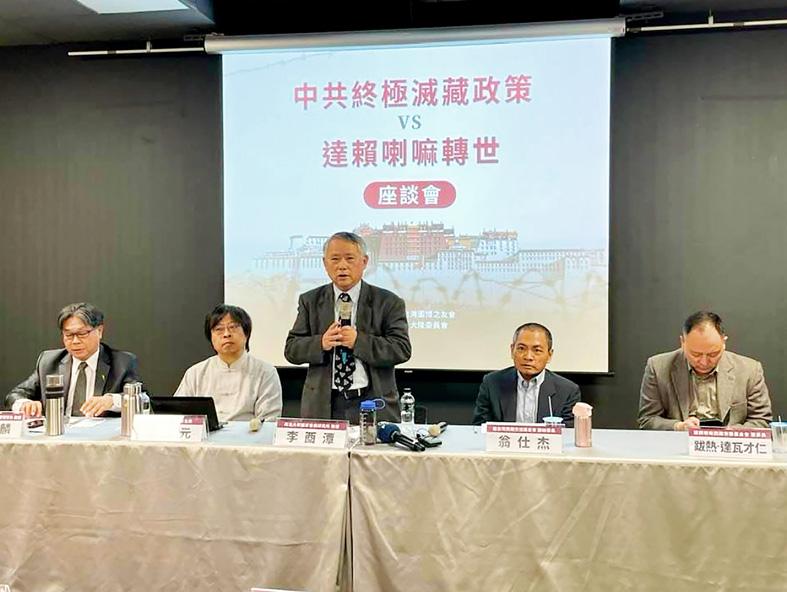Tibetan exile Khedroop Thondop yesterday urged Taiwanese to boycott the 2022 Beijing Winter Olympics over the suppression of religious freedoms in Tibet.
Thondop, a nephew of the Dalai Lama, made the remarks at a conference hosted by Tibetan advocacy groups in Taipei that discussed Beijing’s political interference into the Dalai Lama’s succession.
The conference, titled “China’s ultimate solution in Tibet vs the reincarnation of the Dalai Lama,” marked the 62nd anniversary of the Tibetan uprising on March 10, 1959.

Photo: CNA
Gyaltsen Norbu, the 11th Panchen Lama selected and recognized by China, does not command legitimacy among Tibetans, Thondrop said.
Bejing’s attempt to undermine the will of Tibetans and the religious principles behind the rules of succession has not been effective, which is proven by Gyaltsen Norbu almost completely disappearing from public view, he said.
China will guarantee the recurrence of past failures if it again disregards the will of Tibetans and the Dalai Lama by appointing his successor, who most certainly will not enjoy the world’s respect or admiration, he added.
One of the ways in which China politically interferes in the Tibetan religion is demonstrated by the Chinese Communist Party’s (CPP) attempt to dictate the reincarnation of living Buddhas, said Johnny Chang (張家麟), professor of religious studies at Aletheia University.
For example, China’s Measures on the Management of the Reincarnation of Living Buddhas in Tibetan Buddhism establishes the preconditions for a living Buddha’s reincarnation and the guideline for their evaluation under the Chinese State Administration for Religious Affairs, he said.
“Even after the succession, a reincarnated Buddha’s education and training is subject to official approval, which gives China total control over the creation and education of a living Buddha,” Chang said.
Former Taiwan-Tibet Exchange Foundation deputy secretary-general Own Su-jei (翁仕杰) said that the legitimacy of China’s sovereignty claims over Tibet remains contested, because it rules the territory as a foreign occupying force.
That Tibetans residing inside and outside of China’s borders continue to launch political protests against Chinese rule and demand the Dalai Lama’s return shows that Bejing’s political legitimacy is not accepted by them, he said.
The US, through its Tibet Policy and Support Act, has adopted the position that only Tibetan Buddhists can legitimately appoint successors to lamas and has authorized sanctions against Chinese officials, said Dawa Tsering, chairman of Tibet Religious Foundation of His Holiness the Dalai Lama.
Taiwan and the world’s democracies should put pressure on China over its behavior in Tibet by adopting measures similar to the “watershed” law, Dawa said.

Starlux Airlines, Taiwan’s newest international carrier, has announced it would apply to join the Oneworld global airline alliance before the end of next year. In an investor conference on Monday, Starlux Airlines chief executive officer Glenn Chai (翟健華) said joining the alliance would help it access Taiwan. Chai said that if accepted, Starlux would work with other airlines in the alliance on flight schedules, passenger transits and frequent flyer programs. The Oneworld alliance has 13 members, including American Airlines, British Airways, Cathay Pacific and Qantas, and serves more than 900 destinations in 170 territories. Joining Oneworld would also help boost

A new tropical storm formed late yesterday near Guam and is to approach closest to Taiwan on Thursday, the Central Weather Administration (CWA) said. Tropical Storm Pulasan became the 14th named storm of the year at 9:25pm yesterday, the agency said. As of 8am today, it was near Guam traveling northwest at 21kph, it said. The storm’s structure is relatively loose and conditions for strengthening are limited, WeatherRisk analyst Wu Sheng-yu (吳聖宇) said on Facebook. Its path is likely to be similar to Typhoon Bebinca, which passed north of Taiwan over Japan’s Ryukyu Islands and made landfall in Shanghai this morning, he said. However, it

Taiwan's Gold Apollo Co (金阿波羅通信) said today that the pagers used in detonations in Lebanon the day before were not made by it, but by a company called BAC which has a license to use its brand. At least nine people were killed and nearly 3,000 wounded when pagers used by Hezbollah members detonated simultaneously across Lebanon yesterday. Images of destroyed pagers analyzed by Reuters showed a format and stickers on the back that were consistent with pagers made by Gold Apollo. A senior Lebanese security source told Reuters that Hezbollah had ordered 5,000 pagers from Taiwan-based Gold Apollo. "The product was not

COLD FACTS: ‘Snow skin’ mooncakes, made with a glutinous rice skin and kept at a low temperature, have relatively few calories compared with other mooncakes Traditional mooncakes are a typical treat for many Taiwanese in the lead-up to the Mid-Autumn Festival, but a Taipei-based dietitian has urged people not to eat more than one per day and not to have them every day due to their high fat and calorie content. As mooncakes contain a lot of oil and sugar, they can have negative health effects on older people and those with diabetes, said Lai Yu-han (賴俞含), a dietitian at Taipei Hospital of the Ministry of Health and Welfare. “The maximum you can have is one mooncake a day, and do not eat them every day,” Lai